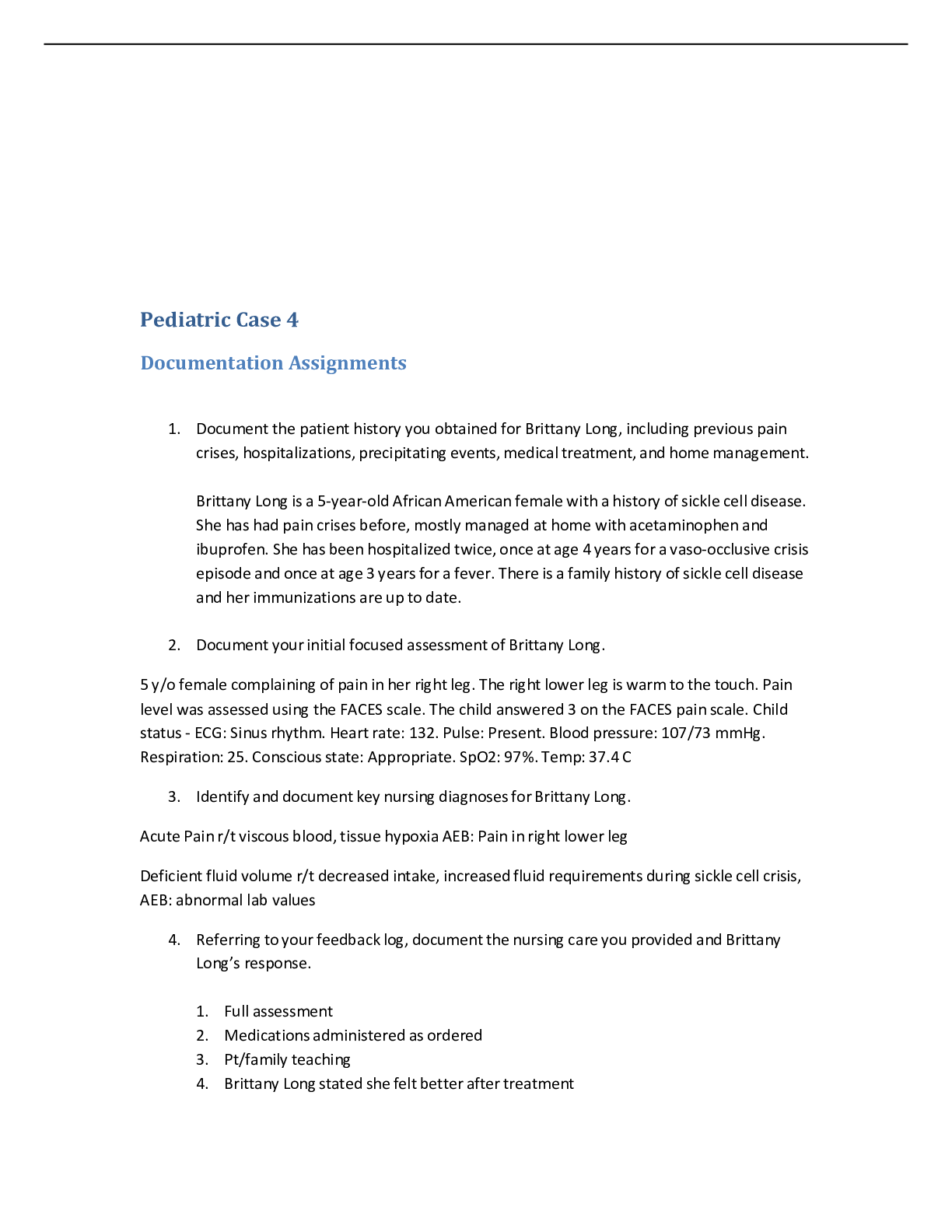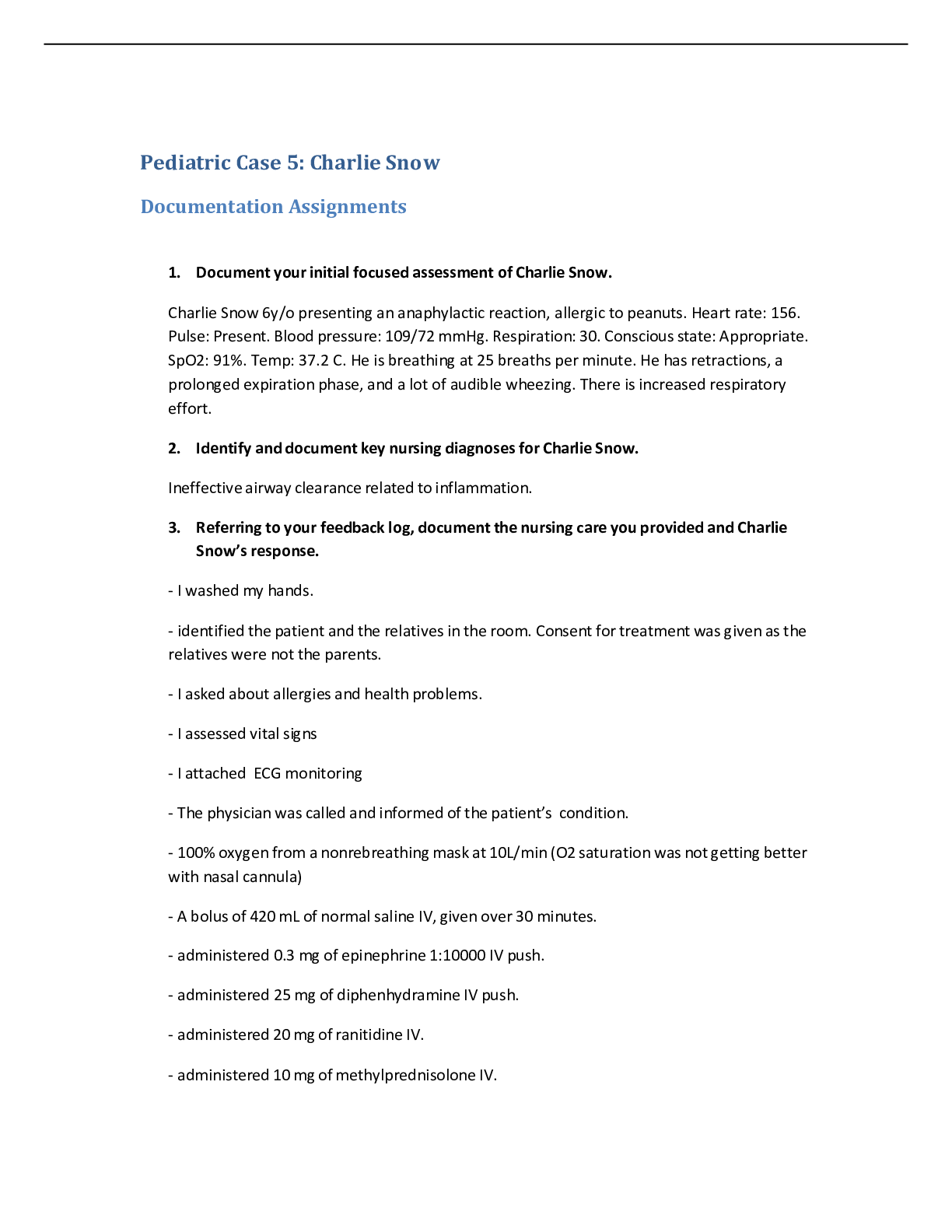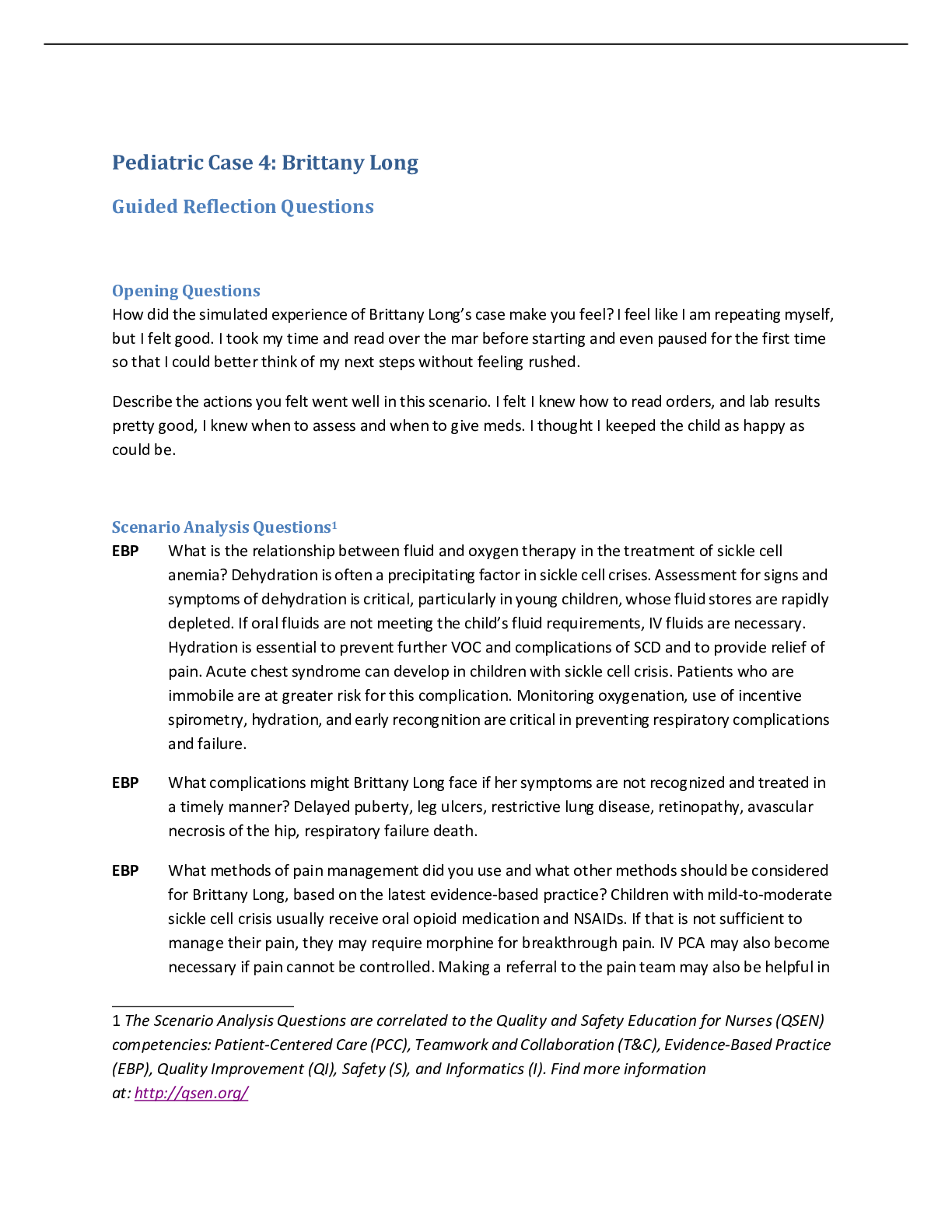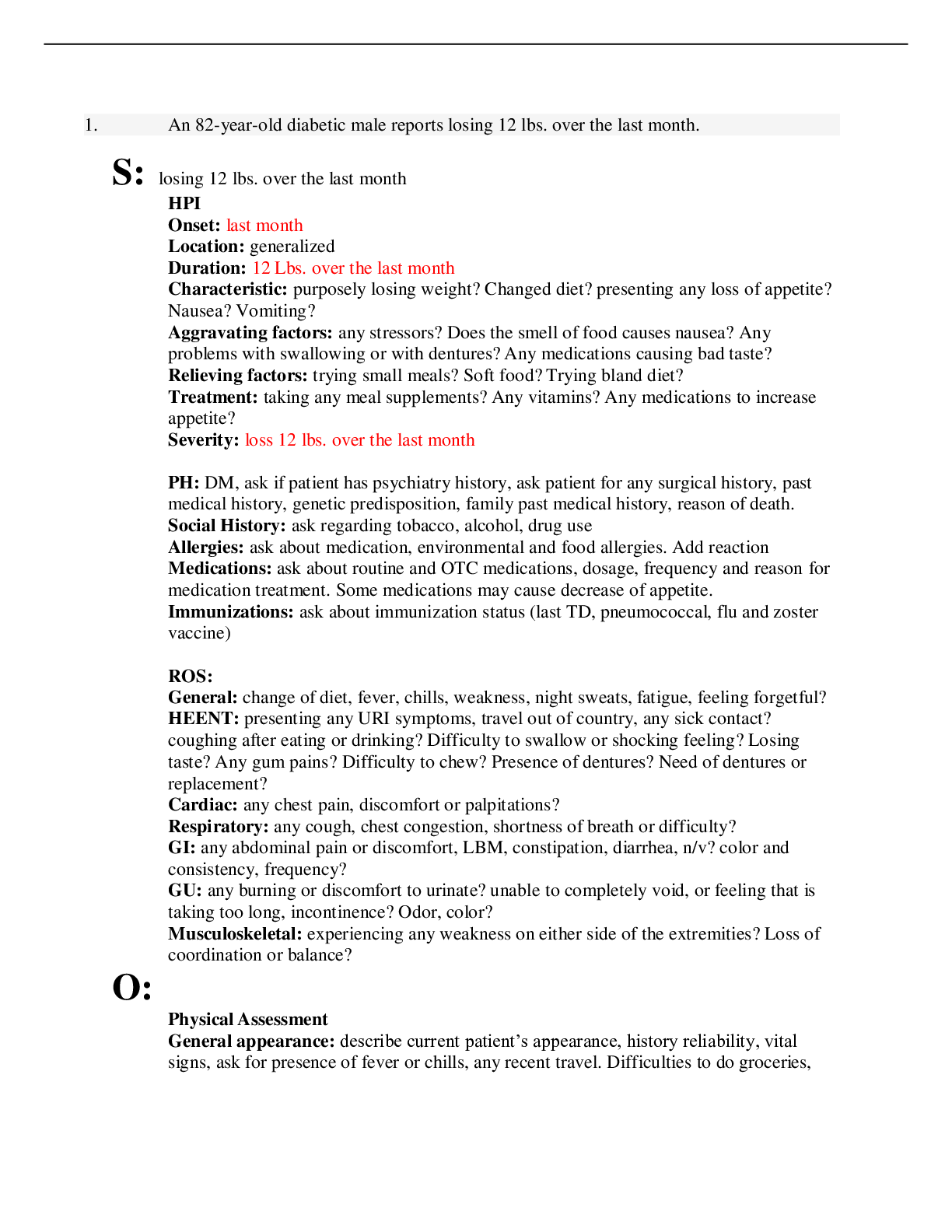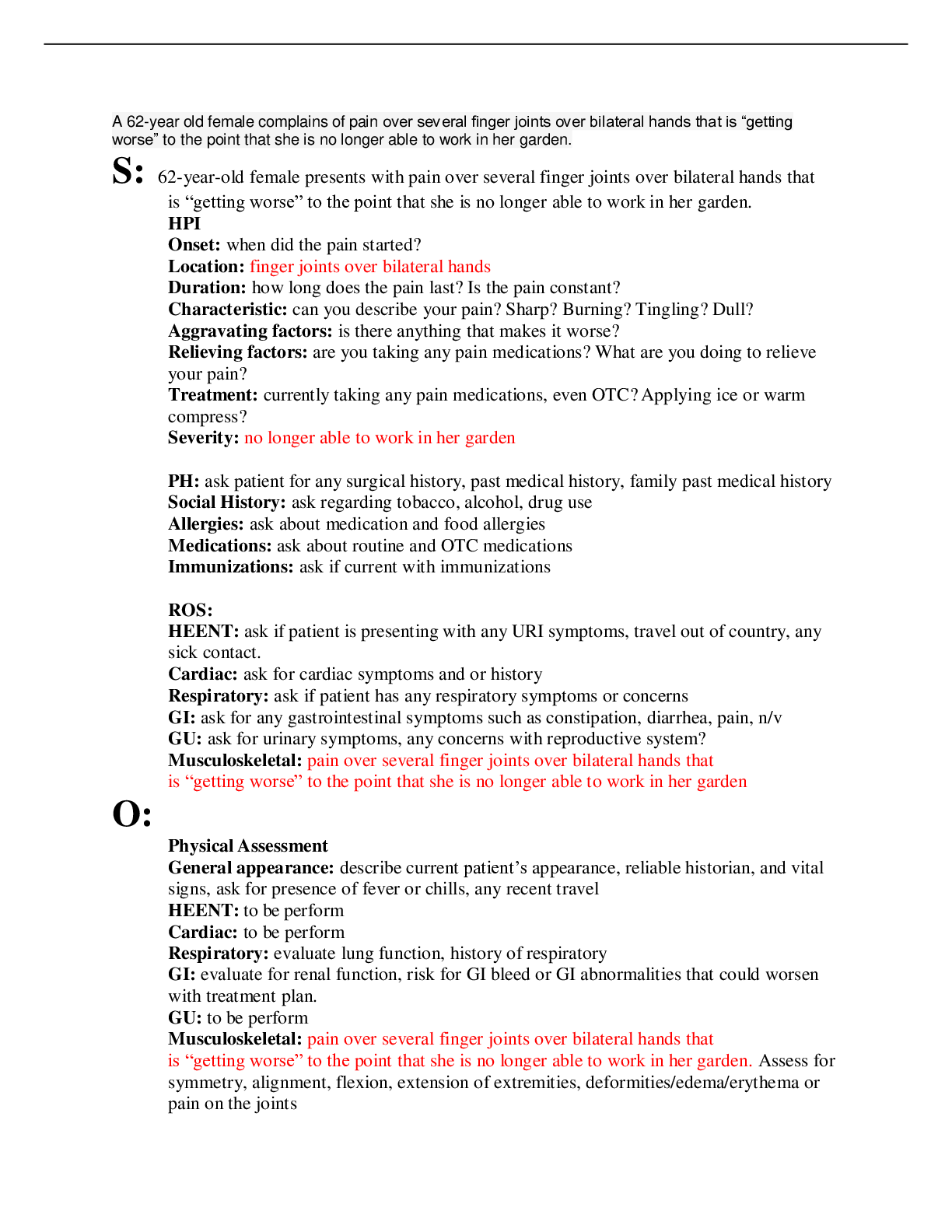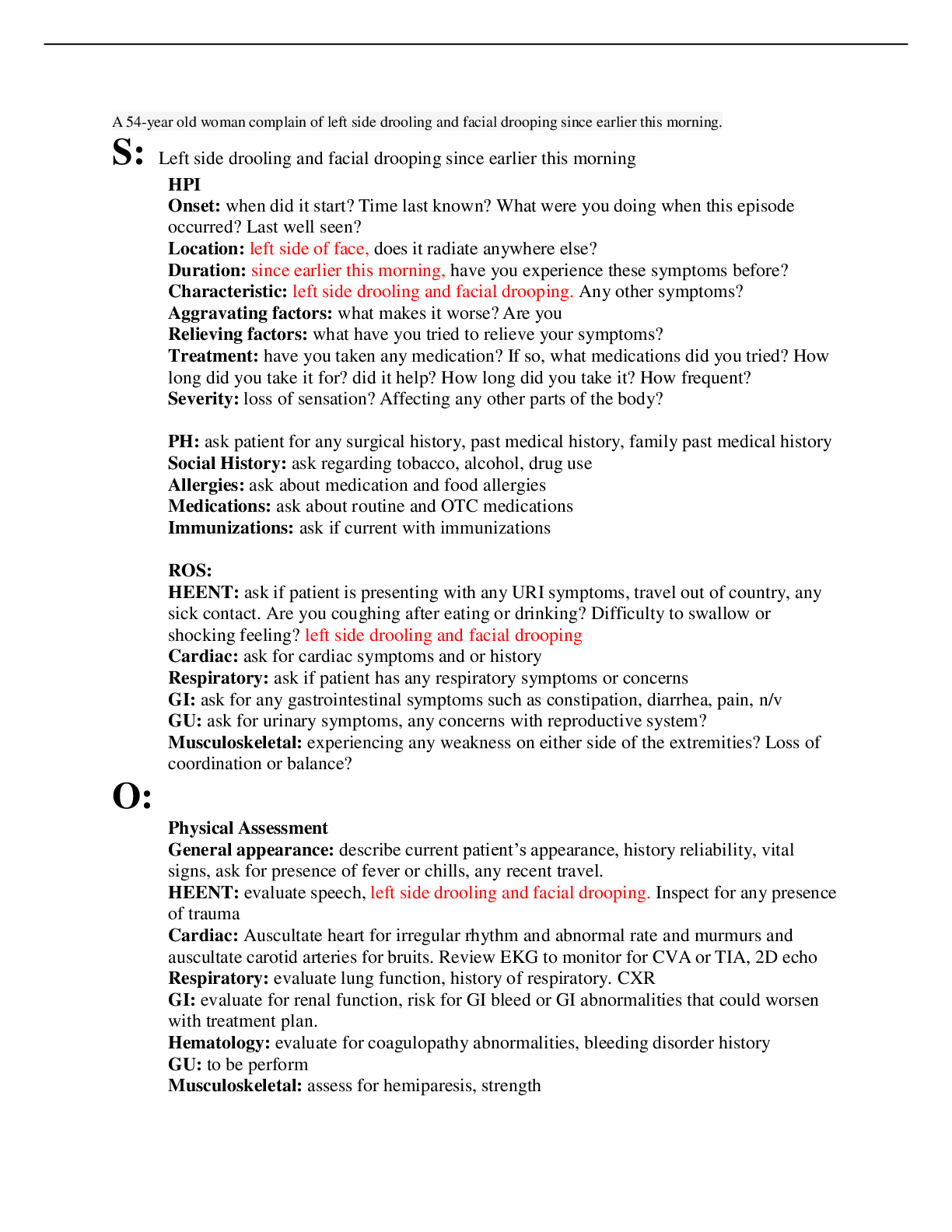*NURSING > CASE STUDY > Case Study 109 Hypoglycemia./ complete solution (All)
Case Study 109 Hypoglycemia./ complete solution
Document Content and Description Below
Case Study 109 Hypoglycemia 1. What do you think is going on with T.R.? 2. What is the first action you would take? 3. Which assessment findings would support the premise that T.R. is exp... eriencing a hypoglycemic reaction? 4. If no glucose meter were available, would you treat T.R. on the assumption he is hyperglycemic or hypoglycemic? Explain your rationale. 5. It is 1025. T.R.'s glucose reading is 50mg/dL. What should your next action be? 6. When you enter the room to administer the juice, T.R. is not responsive enough to drink the juice safely. What should you do? 7. T.R. is breathing at 16 breaths/min and has a pulse of 112 beats/min and regular. Because outpatient resources vary, describe your next actions if (1) your clinic is well equipped for emergencies or (2) your clinic has no emergency supplies. - cardiac monitor with continuous vital signs, IV dextrose or IM glucagon, seizure precautions, glucose monitoring every hour. - Administer dextrose or glucagon in an attempt to stabilize blood glucose, if unable to stabilize in facility, send him to a facility able to handle emergencies. 8. What questions would you ask to find out what precipitated this event? When was the last time you ate or drank anything? What was it? When was the last time you administered your insulin? Did you administer too much? Did you exercise after taking insulin? How often do you check you blood glucose? 9. What further action do you need to take at this time? Check blood glucose, check lab values looking for any other abnormalities that could have lead to hypoglycemia. 10. At 1045, you recheck T.R.'s glucose and the reading is 64 mg/dL. His vital signs are 120/72, 18, 92. Has his status improved or not? Defend your response. His status has improved, but blood glucose is still below 70. His blood pressure, respiration rate, and pulse rate are all within normal limits. 11. What would your next action be? If he is alert and oriented, allow him to eat a snack with carbohydrates, and give him more fruit juice or non-diet soda. If he is not alert enough to swallow, administer more IV dextrose. Continue to monitor LOC. 12. At 1110, you recheck T.R.'s glucose and the reading is 104mg/dL. What should you do now? His blood glucose is stable, his vital signs are stable. Monitor patient per protocol. Give patient meal or snack within 30 minutes. Evaluate etiology of hypoglycemia. Educate patient on how to prevent future episodes. 13. Based on this information, why did T.R. experience this episode of hypoglycemia? An apple is not a substantial form of carbohydrates. The apple did not have enough nutrients to be able to converted to maintain glycemic control. Too much insulin was administered for the food provided. 14. Based on your knowledge of the types of insulin T.R. isreceiving,whenwould you expect T.R. to experience a hypoglycemic reaction? Lantus peaks: 6 hours = 1:45 Humulin R peaks 2-4 hours = 9:45-11:45 15. He says he had two similar low-blood sugar episodes recently. He treated them by eating a candy bar. He says he is on a 2000-calorie, carbohydrate-controlled diet but has been checking his blood glucose levels every "couple of days" only. What common mistake in previously treated episodes of hypoglycemia did T.R. make? T.R. is not checking his blood sugar level as often as he should be; this should be done thrice daily before each meal, and also before bedtime. - Based upon the information given in the progress report, T.R. is taking his insulin without checking his blood sugar level beforehand. He is also eating little food after taking the insulin. If his blood sugar already was low, insulin would make it even lower, thus putting him in danger of a hypoglycemic episode. Glargine and Regular insulin have the longest lasting peak effect on the body, as well. Long lasting insulin should be given at bedtime to regulate the blood sugar level overnight. 16. List at least four important points that you would stress in a teaching plan with T.R Alcohol can increase insulin secretion, thus result in a low blood sugar (hypoglycemia). - Avoid drinking on an empty stomach. Avoid binge drinking and/or sustained drinking. - The s/s of hypoglycemia may be similar to those s/s of drunkenness. It is also possible that hypoglycemic s/s can occur for up to a 16 hour time period following heavy drinking. - Avoid any sugary drink. Drink something that has a low carbohydrate count. - He should carry an ID bracelet stating he is a Type 1 diabetic - He should carry glucose tablets on him or obtain a prescription for glucagon emergency kit 17. You instruct him to check his blood glucose at 1230 then eat lunch at the normal time. He is to follow up with you in 1 week to discuss how he is managing. You will determine that T.R. understands your teaching regarding hypoglycemia if he states: a. "I need to eat within 30 minutes of taking the regular insulin." [Show More]
Last updated: 1 year ago
Preview 1 out of 3 pages
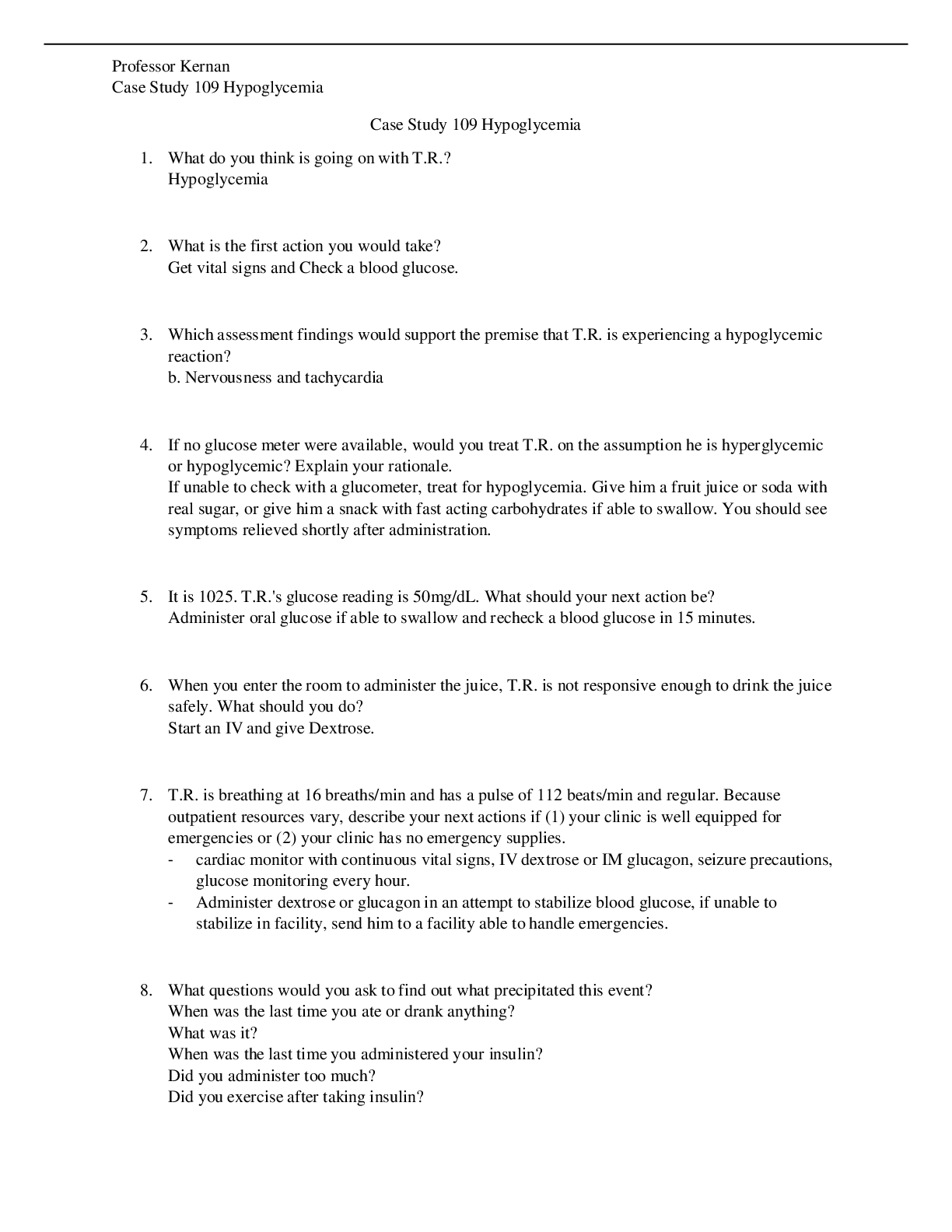
Buy this document to get the full access instantly
Instant Download Access after purchase
Add to cartInstant download
We Accept:

Reviews( 0 )
$10.50
Document information
Connected school, study & course
About the document
Uploaded On
Aug 10, 2021
Number of pages
3
Written in
Additional information
This document has been written for:
Uploaded
Aug 10, 2021
Downloads
0
Views
49

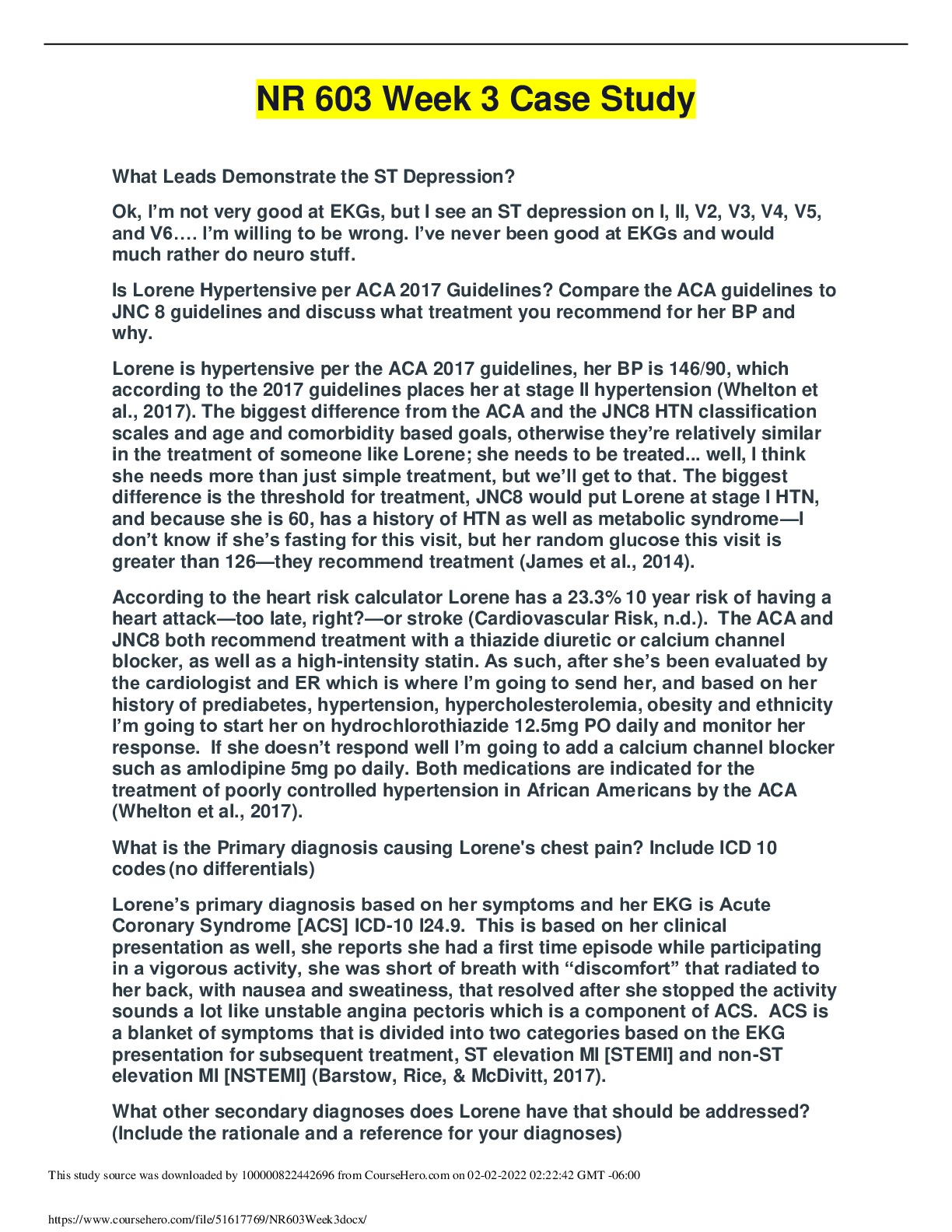
.png)
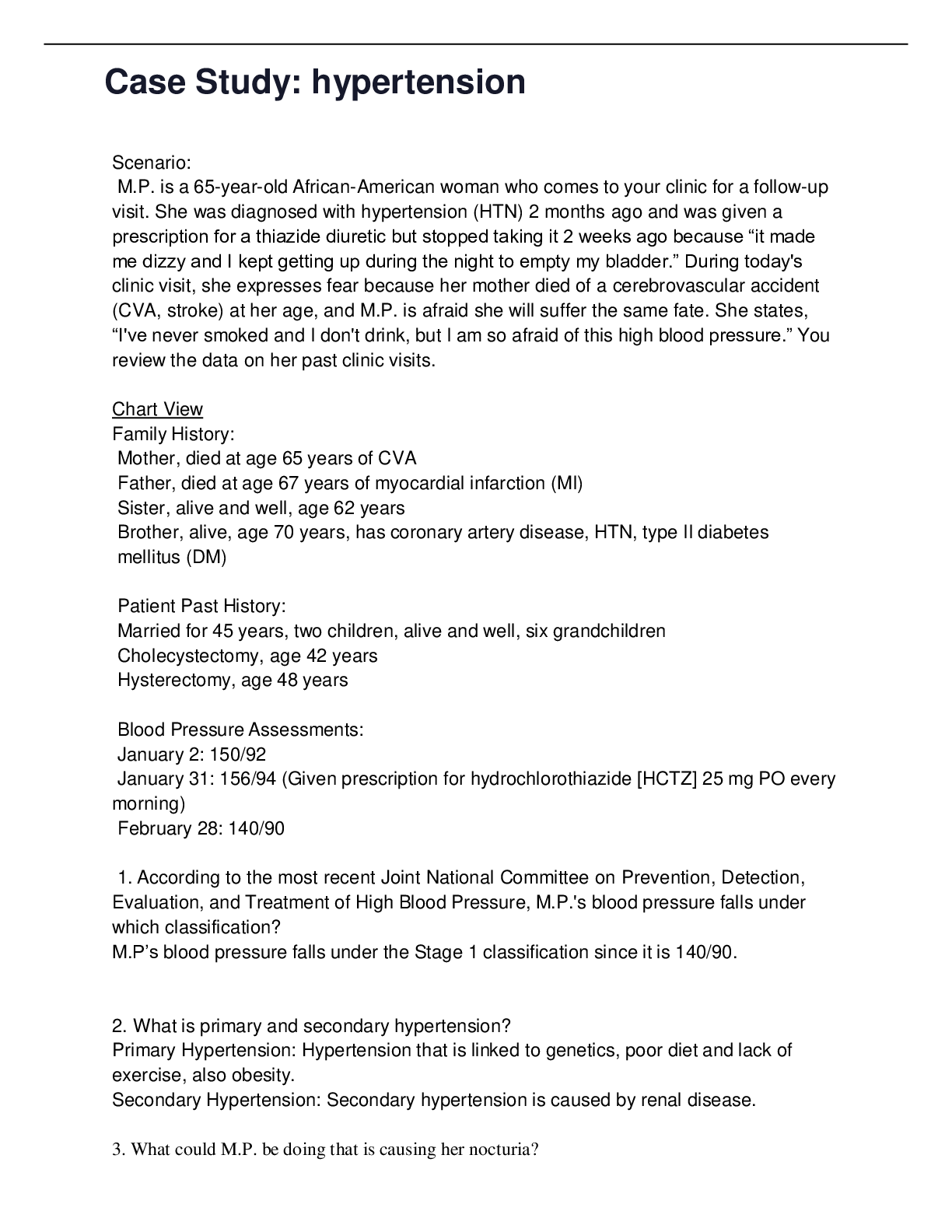
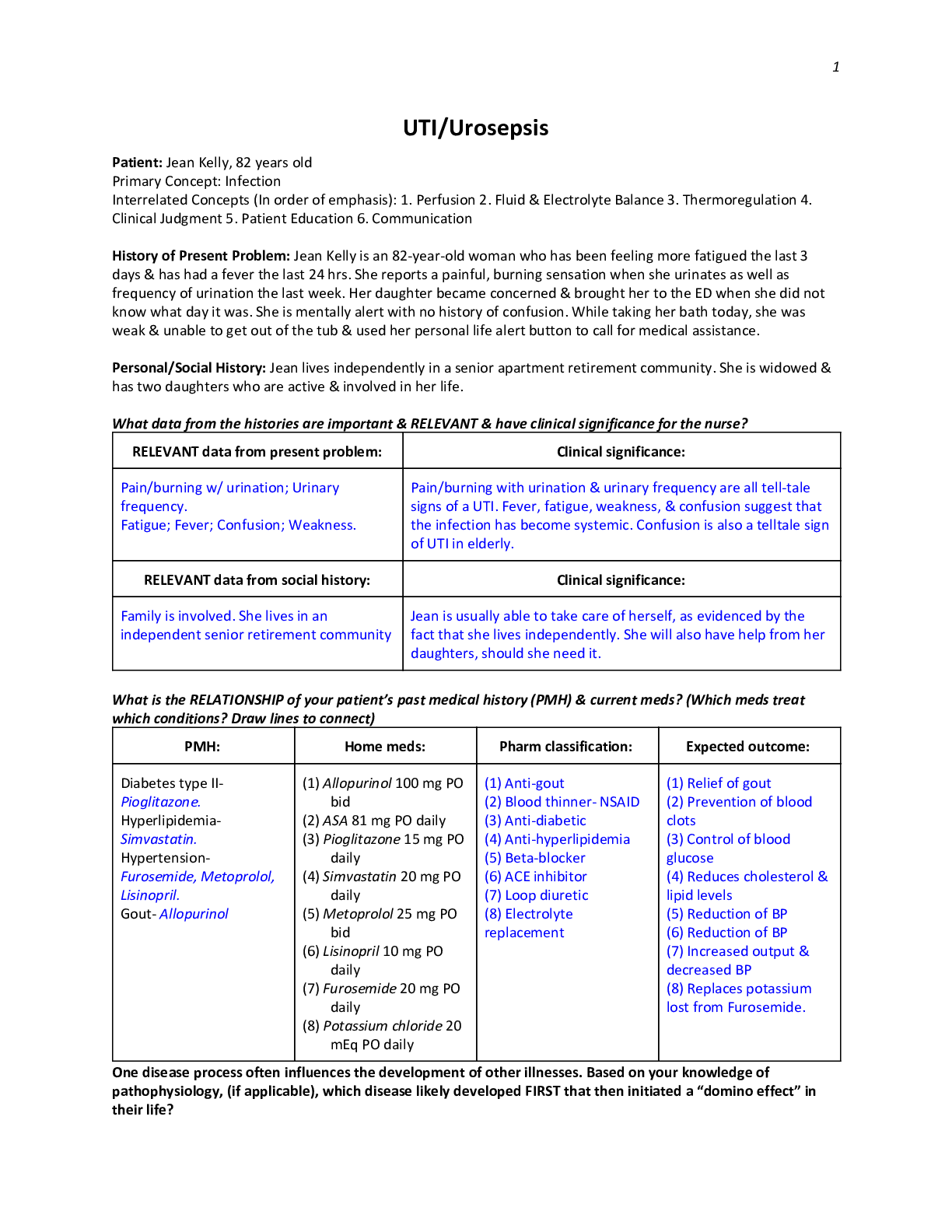
.png)
 (1).png)
